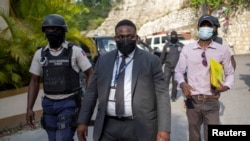President Joe Biden says, while he is not open to U.S. military involvement in Haiti, he is planning to send troops to fortify the U.S. Embassy in the capital, Port-au-Prince.
"We're only sending American Marines to our embassy," Biden said Thursday, during a joint news conference with visiting German Chancellor Angela Merkel. "The idea of sending American forces to Haiti is not on the agenda."
Haitian President Jovenel Moise was shot and killed in the pre-dawn hours of July 7 at his private residence in a wealthy suburb of Port-au-Prince. His wife, Martine, was injured in the attack and is recovering from surgery at a Miami, Florida, hospital.
Interim Prime Minister Claude Joseph told reporters he has spoken to the first lady several times and that she is doing well.
President Biden has condemned the assassination and dispatched a special U.S. delegation to Haiti to assist with the investigation.
Last week, Haiti Elections Minister Mathias Pierre said a request that U.S. troops be deployed to the country was made during a July 7 discussion between Haiti's interim prime minister, Claude Joseph, and U.S. Secretary of State Antony Blinken. Pierre said Joseph made a request for U.N. troops with the U.N. Security Council on July 8.
In an exclusive interview with VOA, Juan Gonzalez, the U.S. National Security Council senior director for the Western Hemisphere, said the subject did come up during their discussions with Haitian officials.
"There has not been a specific ask for a number of troops or a specific number of support of individuals providing security," Gonzalez told VOA. "So, we've been focusing on the very specific asks which have been how do we actually help train and support and equip the Haitian National Police do its job. They have 13,500 officers - so focusing on where the needs are and of course it's something we're going to continue to study because of course the situation on the ground is quickly evolving."
Gonzalez, who traveled to Port-au-Prince on Sunday, said U.S. officials are in constant contact with their international community counterparts.
“We are also in regular contact with our international partners - including France, the leadership of the Caribbean community, the Dominican Republic and of course we've been active on the U.N. Security Council. Ambassador Linda Thomas [Greenfield] has actively been in contact with our counterparts, so it's not something that is just the United States, but the international community all are uniting behind the Haitian people," he told VOA.
The deployment of U.N. police or peacekeeping troops would have to be approved by the Security Council. The U.N. had a stabilization mission in the country from 2004 to 2017. Diplomats said that there is currently little appetite for sending a new mission to Haiti.
The NSC official said there is a team of eight FBI agents on the ground in Haiti, assisting with the investigation into president Moise's murder.
"A number of officials from the Department of Homeland Security are helping on everything from tracing the weapons to the body armor and the cellphones that were being used and do everything possible to get to the bottom of who was involved and who is responsible for the assassination,” Gonzalez said.
A VOA Creole reporter saw FBI agents in the wealthy Pelerin neighborhood of Haiti's capital, where President Moise's private residence is located. They were armed and working with Haitian law enforcement.
Murder investigation
In Port-au-Prince, National Police Chief Leon Charles denied that interim Prime Minister Claude Joseph was involved in the Moise assassination plot.
According to Charles, 27 people have been interrogated so far, and information gleaned from those interrogations found no connection between Joseph and the alleged murderers.
The chief said Dimitri Herard, head of security at the National Palace, is in police custody. He has been placed in isolation and has been relieved of his duties, Charles said. Herard will remain in isolation until he is questioned by investigators, the chief said, without specifying exactly where in the capital Herard is being held.
The police chief said 23 suspects are being interrogated—two Haitian Americans, three Haitians and 18 Colombians. Three others who participated in the attack on the president were killed, he said.
Reaction in Haiti's north
In Wanament, the north and northeastern branch of the political party PLANSPA (Platfom Nasyonal Sekte Popile Ayisyen) held a press conference Thursday to denounce the assassination of president Moise.
"The coordinators for the PLANSPA party for the north and northeast regions vehemently condemn this terrorist act. This is the first time such a crime has taken place in the country where a band of shameless criminals succeeded in assassinating a president in his home," a party official said.
PLANSPA called for justice for President Moise and said members will keep pushing for that.
In Gonaives, the most populous city in the agricultural Artibonite region, the Moise assassination remains a hot topic, according to VOA Creole's reporter there. He says the city was tense on Monday with tires burning in the streets and gunshots heard. On Tuesday, daily activities had returned to normal. The reporter said the flag is flying at half-staff in honor of Moise and some government offices have been decorated in black, in a sign of mourning.
According to the Moise family, the president desired to be buried in the north of Haiti, next to his father.
Spanish reporter Jorge Agobian, White House correspondent Steve Herman, U.N. correspondent Margaret Besheer, Matiado Vilme in Port-au-Prince, Jaudelet Junior Saint-Vil in Wanament, Exalus Mergenat in Gonaives contributed to this report.







